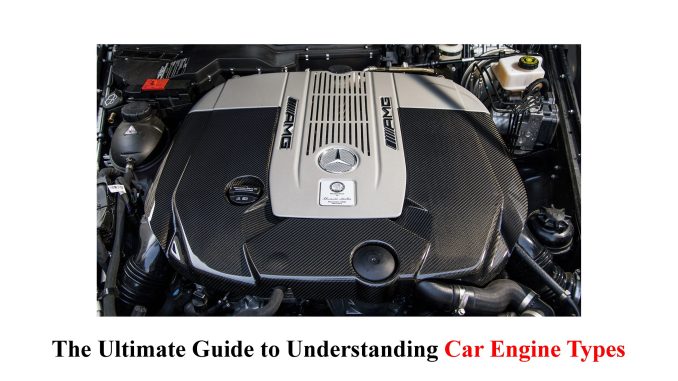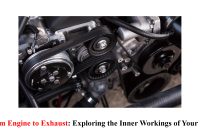
Introduction to Car Engines
Welcome to the exciting world of car engines! Whether you’re a seasoned gearhead or just getting started on your automotive journey, understanding the different types of car engines is essential knowledge for any driver. From the humble four-cylinder to the powerful V8, each engine type has its own unique characteristics and performance capabilities.
In this ultimate guide, we’ll dive deep into the realm of car engines, exploring their various types, pros, and cons, factors to consider when choosing one for your vehicle, as well as maintenance tips and common problems to watch out for. So buckle up and get ready to rev your intellectual engines as we explore everything you need to know about car engine types!
But before we dive into specifics, let’s take a moment to appreciate just how remarkable these mechanical marvels are. Car engines are like the heart and soul of an automobile – they provide power and make all those thrilling drives possible. Without them, our cars would be nothing more than metal shells sitting in our driveways.
Now that we’ve set the stage for our journey into engine territory let’s move on to discover what exactly makes each engine type unique!
The Different Types of Car Engines
When it comes to car engines, there is a wide variety of options available in the market. Each type has its unique features and benefits. Let’s explore some of the most common car engine types:
1. Gasoline/Petrol Engines: These are the most widely used engines in cars today. They run on gasoline or petrol fuel and are known for their smooth performance and power.
2. Diesel Engines: Diesel engines are typically found in trucks and larger vehicles. They use compression ignition to ignite the fuel, resulting in better torque and fuel efficiency.
3. Hybrid Engines: Hybrid engines combine an internal combustion engine with an electric motor to optimize fuel economy while still providing decent power.
4. Electric Motors: Fully electric vehicles (EVs) rely solely on electric motors for propulsion, offering zero emissions and quiet operation.
5. Rotary Engines: Rotary engines work by using rotors instead of pistons, allowing for compact design and high-revving capabilities.
6. Turbodiesel Engines: These engines combine turbocharging with diesel technology to deliver both power and efficiency.
7. Twin-Turbocharged Engines: Twin-turbocharged engines use two turbos to increase power output without sacrificing fuel efficiency.
8. Wankel Engine: The Wankel engine is a type of rotary engine that offers high-performance characteristics but can be less efficient than traditional piston-driven engines.
Each type of car engine has its advantages and disadvantages depending on factors like performance requirements, cost considerations, environmental concerns, and personal preferences.
Pros and Cons of Each Engine Type
When it comes to car engines, there is a wide variety of types to choose from. Each engine type has its own set of advantages and disadvantages, making it important to understand what each one offers before making a decision.
One popular engine type is the gasoline or petrol engine. These engines are known for their power and responsiveness, providing quick acceleration and high speeds. Gasoline engines are also widely available, making them easy to find and maintain. However, they can be less fuel efficient compared to other options and may produce more emissions.
Another common engine type is the diesel engine. Diesel engines have long been favored for their fuel efficiency, often providing better mileage than gasoline engines. They also tend to have more torque, which makes them great for towing heavy loads or navigating hilly terrain. On the downside, diesel vehicles can be more expensive upfront and require regular maintenance.
For those seeking an eco-friendly option, hybrid engines offer a compelling choice. Hybrid cars combine both an internal combustion engine with an electric motor system. This combination allows for increased fuel efficiency and reduced emissions while still providing ample power when needed. However, hybrid vehicles can be pricier due to their advanced technology.
Electric engines are another environmentally friendly option that is gaining popularity in recent years. Electric cars run solely on electricity stored in batteries rather than traditional fuels like gas or diesel. They produce zero emissions during operation and offer quiet rides with instant torque delivery.
However, electric vehicles typically have limited driving ranges per charge and require access to charging stations for longer trips.
There’s the rotary or Wankel engine—an unconventional choice that some car enthusiasts swear by.
These compact yet powerful engines feature spinning rotors instead of pistons found in conventional internal combustion engines.
They deliver smooth power delivery at high RPMs but may suffer from higher oil consumption rates
and potentially higher maintenance costs.
Factors to Consider when Choosing an Engine Type
When it comes to choosing the right engine type for your car, there are several important factors to consider. Understanding these factors can help you make an informed decision that meets your specific needs and preferences.
One crucial factor is fuel efficiency. Are you looking for a car that maximizes fuel economy? If so, considering engines with hybrid or electric options might be the way to go. These engines offer excellent mileage and reduced emissions, making them environmentally friendly choices as well.
Another aspect to keep in mind is performance. Do you prioritize power and acceleration? In this case, a turbocharged or supercharged engine could be your best bet. These engines deliver impressive horsepower and torque, giving your vehicle that extra oomph on the road.
Additionally, reliability plays a significant role in choosing an engine type. It’s essential to research each engine’s track record for durability and longevity. This information can help ensure that your chosen engine will provide years of trouble-free operation.
The cost of maintenance should also be considered when selecting an engine type. Different engines have varying maintenance requirements and associated costs. Some may require more frequent oil changes or specialized parts, which can impact long-term ownership expenses.
Think about compatibility with other features you desire in a car – such as towing capacity or all-wheel drive capabilities – as certain types of engines are better suited for specific tasks.
By carefully weighing these factors against your personal needs and priorities, you’ll be able to choose the perfect engine type for your car!
Maintenance and Care Tips for Car Engines
Regular maintenance and care are crucial to keep your car engine running smoothly and extend its lifespan. Here are some essential tips to help you take good care of your car engine:
1. Regular Oil Changes: One of the most important tasks is changing the oil at regular intervals as recommended by the manufacturer. Fresh oil helps lubricate the moving parts, reduces friction, and prevents excessive wear.
2. Check Fluid Levels: In addition to oil, regularly check other fluid levels such as coolant, brake fluid, power steering fluid, and transmission fluid. Low levels can lead to overheating or damage in these systems.
3. Clean Air Filters: A clean air filter ensures proper airflow into the engine, leading to better fuel combustion and improved performance. Replace or clean it according to your vehicle’s maintenance schedule.
4. Monitor Engine Coolant: The coolant helps regulate engine temperature and prevent overheating. Regularly check coolant levels and inspect hoses for leaks or cracks.
5. Keep Belts in Good Condition: Inspect drive belts for signs of wear or cracking regularly; they transfer power from the engine’s crankshaft to various accessories like alternators and water pumps.
6. Timely Spark Plug Replacement: Worn-out spark plugs can affect fuel efficiency, cause misfires, or even damage catalytic converters over time. Follow your vehicle’s recommended replacement interval.
7. Regular Tune-Ups: Schedule periodic tune-ups with a qualified mechanic who will inspect all aspects of your car’s engine system including ignition timing, fuel injectors, emission control systems, etc., ensuring everything works optimally.
8. Drive Responsibly:
Smooth driving habits like avoiding rapid acceleration or hard braking reduce stress on the engine components leading to less wear and tear.
Following these maintenance tips along with staying up-to-date with routine inspections outlined in your owner’s manual guidebook will ensure that you proactively address any potential issues before they become major problems. Taking care of your car engine will not only save you.
How to Identify Common Engine Problems
One of the key aspects of car maintenance is being able to identify common engine problems. By recognizing these issues early on, you can prevent further damage and potentially costly repairs. Here are some tips to help you identify common engine problems:
1. Listen for any unusual noises: Pay attention to any strange sounds coming from your engine, such as knocking, grinding, or squealing. These could indicate issues with the belts, bearings, or valves.
2. Check for fluid leaks: Keep an eye out for any puddles or stains underneath your car. Leaking fluids, such as oil or coolant, maybe a sign of a problem that needs immediate attention.
3. Monitor your dashboard warning lights: Modern cars have sensors that detect various engine-related issues and signal them through warning lights on the dashboard. Don’t ignore these warnings; they are there for a reason.
4. Notice changes in performance: If you experience a decrease in power or acceleration, rough idling, or stalling, it may be indicative of fuel system problems or ignition issues.
5. Smell and inspect exhaust smoke: Unusual smells emitting from the exhaust like burning rubber or gasoline could suggest an issue with the engine’s components.
Remember that identifying common engine problems requires regular observation and familiarity with how your car typically operates. When in doubt, consult a professional mechanic who can diagnose and address any concerns promptly.
Conclusion
Understanding the different types of car engines is essential for every car owner. Whether you’re a gearhead or just someone who wants to make an informed decision when buying a new vehicle, knowing the pros and cons of each engine type can help you choose the right one for your needs.
In this ultimate guide, we’ve explored the various car engine types, including gasoline, diesel, hybrid, electric, and rotary engines. Each type has its unique characteristics and advantages. Gasoline engines are widely available and offer good performance but consume more fuel. Diesel engines provide better fuel efficiency and torque but come with higher emissions. Hybrid engines combine internal combustion with electric power for improved efficiency. Electric engines produce zero emissions but have limited range.
When choosing an engine type, consider factors such as your driving habits, budget, environmental concerns, and availability of charging stations or fueling options in your area. It’s important to weigh these factors against your priorities to ensure that you select an engine type that aligns with your needs.
Once you’ve chosen an engine type for your vehicle, proper maintenance is crucial to keep it running smoothly. Regularly checking oil levels and changing filters are simple yet effective ways to prolong the life of your engine.



Leave a Reply